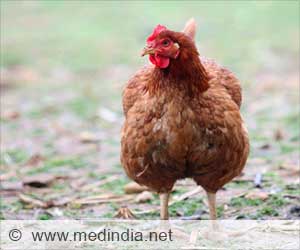
Ongoing avian influenza outbreaks in animals pose risk to humans
Go to source). Health experts stated on Monday, April 29, 2024, that although there is currently no documented evidence of continuous transmission of bird flu from humans to humans, the recent mutations of the virus indicate a potential proximity to humans.
Wild birds migrating have introduced the virus to poultry farms. Nevertheless, over the past few years, this strain of bird flu, H5N1, has transitioned to mammals.
The H5N1 virus claimed the lives of a significant number of birds in 2023, and also infected otters, sea lions, foxes, dolphins, and seals. Furthermore, it has recently spread to various cattle farms in the United States. In an alarming discovery, health officials in the US detected traces of bird virus in pasteurized milk sold in stores, with approximately 20 percent of initial test samples across the country containing these fragments.
Dr Rajeev Jayadevan, co-chairman of the Indian Medical Association’s National Covid-19 Task Force, told IANS, “This shows that the H5N1 bird flu virus has now adapted for circulating among mammals. It is now able to easily spread from mammal to mammal, rather than having to jump each time from bird to mammal. This shows the virus has made suitable adaptations already. And bird flu virus has moved one step closer to humans,"
He further emphasized, “there is no record to date of sustained human-to-human transmission. This can only occur if the virus makes more adaptations by mutating. The concern now is the virus has found a new host among cattle, which is always in contact with man," (2✔ ✔Trusted Source
Factsheet on A(H5N1)
Go to source).
‘A majority of bird flu human infections have been linked to direct contact with infected or ill birds, or their feces, particularly in domestic environments such as wet markets in Asia or backyard farming. #birdflu #mutation #virus #medindia’
Tweet it Now
Advertisement
What is Avian Flu?
Avian influenza, also called Bird Flu or Avian Flu, is a viral infection. It is caused by influenza strains that typically affect wild birds. These strains can also lead to outbreaks in commercial or backyard poultry, and occasionally in other animals.The strain Influenza A(H5N1) is the predominant cause of infecting humans.
Advertisement
What Are the Symptoms of Avian Flu?
Avian influenza can lead to respiratory issues in birds like nasal discharge, coughing, and sneezing, as well as symptoms such as diarrhea, lethargy, reduced egg laying, or even sudden death (3✔ ✔Trusted SourceBird Flu (Avian Influenza)
Go to source).
In humans, avian flu can lead to symptoms resembling those of influenza, including fever, cough, sore throat, runny nose, and muscle pain. Occasionally, individuals may experience diarrhea and vomiting, and in rare cases, seizures may occur.
Advertisement
Possibility of Avian Flu to Transmit to Humans?
Last week in Ranchi, Jharkhand, the occurrence of bird flu, a prevalent issue in India, sparked worries about human infections. As a precautionary measure, two doctors and six staff members from the Regional Poultry Farm in Hotwar were placed under quarantine for two days. Nevertheless, the throat swab samples taken from them on April 27 and sent for testing yielded negative results.As per information provided by the World Health Organisation, there have been 873 documented cases of human infection with influenza A (H5N1) and 458 fatalities reported internationally from 2003 to 2023 across 21 countries. Nevertheless, there has been no evidence of continuous human-to-human transmission so far.
A biologist, Vinod Scaria, told IANS, “Human infection due to avian influenza happens only with close contact with infected animals. Although the risk for human infection is rare, such occurrences come with a high mortality rate,"
Dr. Jayadevan said The high mortality rate is because "humans have no prior immune memory for this particular type of influenza virus,".
The World Health Organization (WHO) affirms that based on the existing epidemiological and virological evidence, there is no indication that current avian influenza viruses have gained the capability of consistent human-to-human transmission. Nevertheless, the recent incident of transmission to cattle, which allegedly impacted one individual, has brought up new apprehensions.
According to genomic analysis, it appears that the spread of this particular strain among the cattle has been occurring without detection for several months, starting from either December or January.
Dr. Jayadevan told IANS, “Scientists are worried whether the virus will now make further adaptations where it can not only easily infect man, but also spread from man to man, in which case it could become a major catastrophic event. We hope it will not happen,".
The World Health Organization recommends that individuals who are in close contact with cattle and poultry should consistently wash their hands, practice good food safety and hygiene measures, pasteurize milk, and receive vaccinations for seasonal human flu. This is to minimize the likelihood of H5N1 potentially combining with a human avian virus.
Scaria told IANS, "Appropriate personal protection while handling infected birds/dead birds or excreta is very important and awareness of this among the public is important,".
To become infected, a significant quantity of the virus must come into contact with a person's eyes, nose, or mouth. It is important to note that consuming thoroughly cooked poultry or eggs does not lead to contracting bird flu. It is important to be updated regarding bird flu and implement essential measures to reduce the chances of transmission.
References:
- Ongoing avian influenza outbreaks in animals pose risk to humans - (https://www.who.int/news/item/12-07-2023-ongoing-avian-influenza-outbreaks-in-animals-pose-risk-to-humans)
- Factsheet on A(H5N1) - (https://www.ecdc.europa.eu/en/zoonotic-influenza/facts/factsheet-h5n1)
- Bird Flu (Avian Influenza) - (https://my.clevelandclinic.org/health/diseases/22401-bird-flu)













